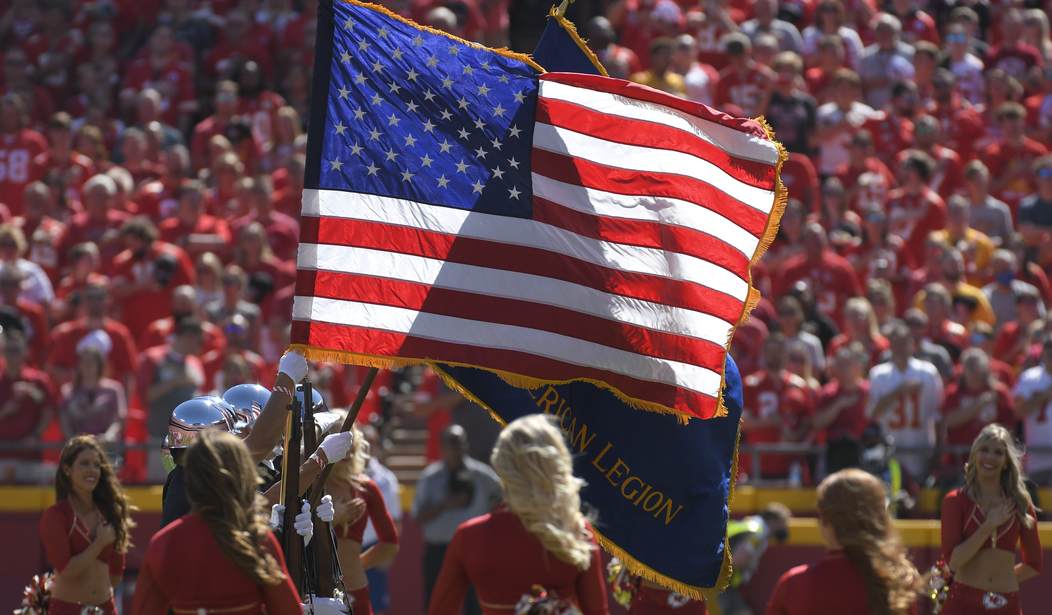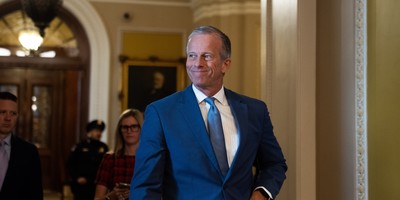The NFL has yet again decided to desecrate the sacred American sport of football, a sport that has united Americans for decades, by playing the divisive Black national anthem before the Super Bowl.
The idea of their being a Black national anthem shouldn't rub anyone the wrong way. The song "Lift Every Voice and Sing" was first performed in the year 1900 and officially adopted by the NAACP 17 years later as the Black national anthem. Since then, it has served as a strong symbol for Black Americans. The song holds deep meaning, symbolizing resilience and hope in the face of past injustices. That is not the issue here.
The issue is that there is a time and place for everything, and the Super Bowl is neither the time nor the place for "Lift Every Voice and Sing."
We don't play the Asian American national anthem, the Muslim American national anthem, the Indian American national anthem or the Native American national anthem. We don't play the national anthem for any other race, color or creed. So what has caused us to play favorites with Black Americans over every other race during the Super Bowl?
The point is, the moment you start playing favorites, you inevitably exclude everyone else. You don't foster unity -- you create division. You send a message, intentional or not, that one group's experience is more deserving of recognition than another's. And in doing so, you dilute what the national anthem is meant to represent: a unified country, not a collection of divided groups.
Recommended
This is why we shouldn't play favorites at all. It's why we should sing only the U.S. national anthem. An anthem made for all Americans that includes everybody regardless of race, color or creed.
Because that is what people don't seem to understand. Yes, America has had a past marred by racial injustice. But our national anthem has always stood for one thing and one thing only. Not white Americans, not Black Americans, but Americans. No matter who you are, no matter where you come from, the national anthem is your anthem. And when that beautiful song is sung, it is sung for every American everywhere.
By inserting a separate anthem into what is meant to be a unifying national event, we are dividing ourselves along racial lines at a time when we should be coming together. The Super Bowl, like the national anthem itself, should be a moment of shared patriotism, of collective identity -- something bigger than our individual differences. But instead of using the occasion to bring us together, the NFL has chosen to highlight what separates us.
Some will argue that acknowledging the Black national anthem does not take away from the national anthem. They will say that recognizing Black history and contributions is not an act of division but rather an act of inclusion. That misses the point. We should highlight the history and contributions of all people everywhere. If we play the national anthem for just one race, we are implicitly saying that the history and contributions of one race are more important than those of other races. Shouldn't we be celebrating the achievements of all Americans who have made this country great?
This is a dangerous precedent, one that undermines the very ideals we claim to champion. If we continue down this road, where does it end? Do we start playing separate anthems for every group that has suffered injustice in this country? Do we segment our national unity based on past grievances rather than coming together as one people? The more we focus on what divides us, the harder it becomes to forge a future in which we see each other as fellow Americans rather than as members of competing racial or ethnic groups.
The United States is not a perfect country. It never has been, and it never will be. But that is the nature of any nation, of any people, of any history. What makes America unique is that it has always strived to improve, to overcome its past failings, and to fulfill its founding promise of liberty and justice for all. That is what the national anthem represents. It is not a song of perfection but of perseverance. It is a reminder that despite our flaws, despite our past mistakes, we are all Americans.
When Francis Scott Key wrote "The Star-Spangled Banner," he wasn't thinking of one racial group or one political ideology. He was writing about America -- about its struggles, its survival and its endurance. That is why the anthem matters. Not because it ignores the past, but because it calls on us to look toward the future together.
That is the anthem we should be singing. That is the anthem that should be played before the biggest football game of the year.
Because when the national anthem plays, it doesn't play for one race, one religion or one political ideology. It plays for all of us. It plays for America. And that should be enough.

























Join the conversation as a VIP Member